
Faith

The Church's concern for migrants has been a long-standing tradition and teaching that became very apparent after the Second World War when it became institutionalized in the organization of the Vatican and dioceses.

DiMarzio
As I have written before, during the past year, some vocal public officials and private organizations have joined with some media outlets in making false or misleading claims regarding the Church's work with migrants and refugees. Initially, they were aimed at Catholic Charities, especially those local organizations working with migrants at the U.S.-Mexico border. Now, as we see with the influx of asylum-seekers at the border, political officials have targeted Catholic Charities organizations in other states by sending asylum-seekers directly to their doorsteps, as recently happened in New York and Sacramento. Even the United States Catholic Conference of Bishops and individual bishops have been implicated as somehow influencing the irregular migration of people to the United States.
These claims have been used as a diversion from the real issue the nation is confronting: a lack of legal channels for migration under our present immigration laws.
A review of the social ministry teaching of the Church will help dispel the doubts that have been placed in the public forum by some uninformed public officials. First, let me be clear: The Church does not advocate for open borders. In fact, the teaching is clear that a sovereign nation has the right to admit those whom it chooses, but it must be based on the common good -- not only of the receiving nation but also of the migrants. In fact, the Church prefers that a person not exercise their right to migrate if conditions in their home country are adequate for a decent life. The Church never encourages illegal or undocumented migration but advocates for legal pathways for their migration. The migrants as well would choose legal means, if available.
As a young priest, one of my duties was the supervision of a local shelter. I remember being asked a question by an undocumented woman at the shelter: "Is it a sin to be undocumented?" "No," I said, "it is not your sin."
Migrants have well-formed consciences and make decisions in accord with what they know and believe, often in desperate situations. The unspoken truth of undocumented migration today is that, because of an inadequate public policy, undocumented immigrants labor -- without legal rights and at very low wages -- for the benefit of our own nation.
The Church's concern for migrants has been a long-standing tradition and teaching that became very apparent after the Second World War when it became institutionalized in the organization of the Vatican and dioceses. New Catholic organizations were formed to deal with refugee resettlement. More recently, a joint pastoral letter of the U.S. and Mexican bishops 20 years ago stated: "Religious and social service providers, ... without violating civil law, attempt to respond to the migrant knocking at the door."
These organizations do not encourage undocumented migration, but they deal with the people on their doorsteps. In many places, church organizations cooperate with local, state, and federal governments in meeting the needs of both documented and undocumented migrants. Some public officials have used this to falsely claim our Church organizations financially benefit from the assistance rendered. In my more than 50 years of providing services with government assistance, I can testify that as nonprofit organizations there was never a profit but always a deficit in doing these works of charity for migrants.
Another almost unbelievable accusation is that the Church somehow supports human trafficking and smuggling by accepting responsibility for assisting these migrants once they have arrived. Nothing could be further from the truth. It even has been insinuated about our programs for unaccompanied children separated from their parents. The fact is the government has already separated the parents from their children and we have become the caretakers.
If there ever was a case of scapegoating the good Samaritans of this world, this current effort to paint the Church as a promoter of undocumented migration wins the prize. And this is incorrect.
In truth, the Church's work assisting migrants is to make up for the failures of the government, which refuses to enact just immigration laws. The undocumented woman I met at the shelter should not have to worry about whether being undocumented is a sin. She should have the opportunity to migrate in a legal and safe manner and have her God-given human dignity respected.
- Bishop Nicholas DiMarzio is retired bishop of the Diocese of Brooklyn, N.Y. He writes the column "Walking With Migrants" for Catholic News Service and The Tablet.
Recent articles in the Faith & Family section
-
Scripture Reflection for Nov. 3, 2024, Thirty-First Sunday in Ordinary TimeFather Joshua J. Whitfield
-
Hurricane Helene: Subsidiarity and solidarity in actionDr. R. Jared Staudt
-
What is the church's teaching on transgender issues?Jenna Marie Cooper
-
The people who pray for usJaymie Stuart Wolfe
-
Welcoming Archbishop HenningFather Robert M. O'Grady





